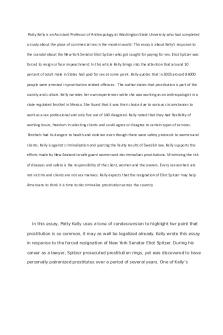Aaron Morgan - Rhetorical Analysis GO The Perils of Indifference - 5448890 PDF

| Title | Aaron Morgan - Rhetorical Analysis GO The Perils of Indifference - 5448890 |
|---|---|
| Author | Anonymous User |
| Course | Business Ethics |
| Institution | University of Arkansas at Monticello |
| Pages | 2 |
| File Size | 70 KB |
| File Type | |
| Total Downloads | 24 |
| Total Views | 169 |
Summary
Eight years before the genocide began, Cambodia was engaged in a bloody civil war. The war pitted the Cambodian monarchy, and later the Cambodian Republic, and its allies, including the United States, against the Cambodian communists. The communists received support from the neighboring Vietcong.
Description
Locally Developed Assessment: “The Perils of Indifference” Directions: Read “The Perils of Indifference” by Holocaust survivor and author, Elie Wiesel, and write down the SOAPSTone elements in the chart below. Then, key into the rhetorical devices he used. In the second chart, record the device in the first column, the quotation from the speech that uses the device in the second column, an explanation for how it is using that device in the third column, and a conjecture of the author’s purpose for using that device in the fourth column. You should be able to identify and analyze at least three rhetorical devices. Speaker
Elie Wiesel
Occasion
Millennium Lecture series, hosted by President Bill Clinton and First Lady Hillary Rodham Clinton.
Audience
The American People, President, White House Officials, Holocaust Survivors.
Purpose
To persuade the audience not to be indifferent to victims of cruelty and injustice.
Subject
He claims that indifference is far more dangerous than hatred.
Tone
He is somewhat distressed and sympathtical in his tone.
Examples: Repetition, metaphor, anaphora, ethos, pathos, logos, diction and/or tone Rhetorical Device Used Ethos
Juxtaposition
Quotation
Explanation (how)
Author’s Purpose (why)
Liberated a day earlier by American soldiers, he remembers their rage at what they saw. And even if he lives to be a very old man, he will always be grateful to them for that rage, and also for their compassion.
He is telling his story or stating his credibility on the subject he is speaking on.
So his speech is believable.
A strange and unnatural state in
He uses the examples like,
He's showing that there is
which the lines blur between light and darkness, dusk and dawn, crime and punishment, cruelty and compassion, good and evil.
“Dusk and Dawn” which are two opposites but still relate to eachother in this instance.
so much hatred and crime in the world but yet, we can still relax and not worry about it.
They no longer felt pain, hunger,
He uses “They…” 4 times which adds rhythm and parrelism
When he uses this parallelism, it lets the thought of these dead people laying there come out smooth wher we can only focus on the imagery and not on his wording.
He repeats indifference to add emphasis to this word.
He wants to repeat indifference to show the importance and the emphasis on how bad and evil indiffernce.
Parrelism thirst. They feared nothing. They felt nothing. They were dead and did not know it.
Repition
Indifference elicits no response. Indifference is not a response. Indifference is not a beginning; it is an end. And, therefore, indifference is always the friend of the enemy, for it benefits the aggressor -- never his victim, whose pain is magnified when he or she feels forgotten....
Similar Free PDFs

Indifference Analysis
- 7 Pages

Indifference Analysis
- 7 Pages

The perils of bad strategy
- 10 Pages

Rhetorical Analysis
- 5 Pages

Rhetorical analysis
- 2 Pages

Rhetorical Analysis of WWF Ad
- 1 Pages

Rhetorical Analysis of a Movie
- 5 Pages
Popular Institutions
- Tinajero National High School - Annex
- Politeknik Caltex Riau
- Yokohama City University
- SGT University
- University of Al-Qadisiyah
- Divine Word College of Vigan
- Techniek College Rotterdam
- Universidade de Santiago
- Universiti Teknologi MARA Cawangan Johor Kampus Pasir Gudang
- Poltekkes Kemenkes Yogyakarta
- Baguio City National High School
- Colegio san marcos
- preparatoria uno
- Centro de Bachillerato Tecnológico Industrial y de Servicios No. 107
- Dalian Maritime University
- Quang Trung Secondary School
- Colegio Tecnológico en Informática
- Corporación Regional de Educación Superior
- Grupo CEDVA
- Dar Al Uloom University
- Centro de Estudios Preuniversitarios de la Universidad Nacional de Ingeniería
- 上智大学
- Aakash International School, Nuna Majara
- San Felipe Neri Catholic School
- Kang Chiao International School - New Taipei City
- Misamis Occidental National High School
- Institución Educativa Escuela Normal Juan Ladrilleros
- Kolehiyo ng Pantukan
- Batanes State College
- Instituto Continental
- Sekolah Menengah Kejuruan Kesehatan Kaltara (Tarakan)
- Colegio de La Inmaculada Concepcion - Cebu








